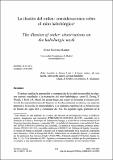Por favor, use este identificador para citar o enlazar a este item:
http://hdl.handle.net/10261/188653COMPARTIR / EXPORTAR:
 SHARE SHARE
 CORE
BASE CORE
BASE
|
|
| Visualizar otros formatos: MARC | Dublin Core | RDF | ORE | MODS | METS | DIDL | DATACITE | |

| Título: | La ilusión del orden: consideraciones sobre el mito habsbúrgico |
Otros títulos: | The illusion of order: observations on the habsburgic myth | Autor: | Sánchez Madrid, Nuria | Palabras clave: | Stefan Zweig Joseph Roth Crisis Mito habsbúrgico Franz Werfel Philosophy of History Habsburgic Myth Rober Musil Filosofía de la historia |
Fecha de publicación: | 2015 | Editor: | Universidad Complutense de Madrid | Citación: | Escritura e imagen 11: 151-172 (2015) | Resumen: | [EN] The paper tackles the construction and perception fo crisis in some prominent authors linked to the recreation of the Habsburg myth, as S. Zweig, F. Werfel, J. Roth and R. Musil. First, I attempt to define the scope of poetic representations of the Empire in the first two writers, taking especialy into appraise the notion of temporality and spiritual dynamics of Mitteleuropa in late ninetennth and early twentieth centuries. Secondly, we will focus on Joseph Roth writings in order to highlight the ambivalence of the idea of political order, to which the author bestows a high adoration as a source of historical sense, although he also dooms the effects of technological progress. Finally, Musil's notion of insufficient reason will provide the framework able to grasp an experience of the crisis that will not lead to nihilism. The main purpose of this paper is to study the poetic side of the political and historical patterns, suggesting a connection between the faculty of judgment, the poetry and the history. [ES] El trabajo analiza la percepción y construcción de la crisis reconocible en algunos autores vinculados a la recreación del mito habsbúrgico, como S. Zweig, F. Werfel, J. Roth y R. Musil. En primer lugar, me ocupo de delimitar el alcance poético de las representaciones del Imperio en los dos primeros escritores, con especial atención a la noción de temporalidad y a la dinámica espiritual de la Mitteleuropa de finales del siglo XIX y comienzos del XX. En segundo lugar, plantearé de la mano de la escritura de Joseph Roth la ambivalencia de la idea de orden político, hacia el que se manifiesta una decidida adoración como fuente de sentido histórico, si bien al mismo tiempo se condenan los efectos del progreso tecnológico. Finalmente, la noción de razón insuficiente de Musil ofrecerá el marco para proceder a una experiencia de la crisis que no desemboque en el nihilismo. El propósito principal de este escrito es contribuir al estudio de la potencia poética de los modelos políticos e históricos, proponiendo una lectura de la conexión entre el Juicio, la poética y la historia. |
Versión del editor: | https://doi.org/10.5209/rev_ESIM.2015.v11.50970 | URI: | http://hdl.handle.net/10261/188653 | DOI: | 10.5209/rev_ESIM.2015.v11.50970 | Identificadores: | doi: https://doi.org/10.5209/rev_ESIM.2015.v11.50970 issn: 1885-5687 |
| Aparece en las colecciones: | (CCHS-IFS) Artículos |
Ficheros en este ítem:
| Fichero | Descripción | Tamaño | Formato | |
|---|---|---|---|---|
| Ilusion_del_orden_SANCHEZ_Nuria.pdf | 203,17 kB | Adobe PDF |  Visualizar/Abrir |
CORE Recommender
WEB OF SCIENCETM
Citations
1
checked on 22-ene-2024
Page view(s)
258
checked on 24-abr-2024
Download(s)
115
checked on 24-abr-2024
Google ScholarTM
Check
Altmetric
Altmetric
Este item está licenciado bajo una Licencia Creative Commons

